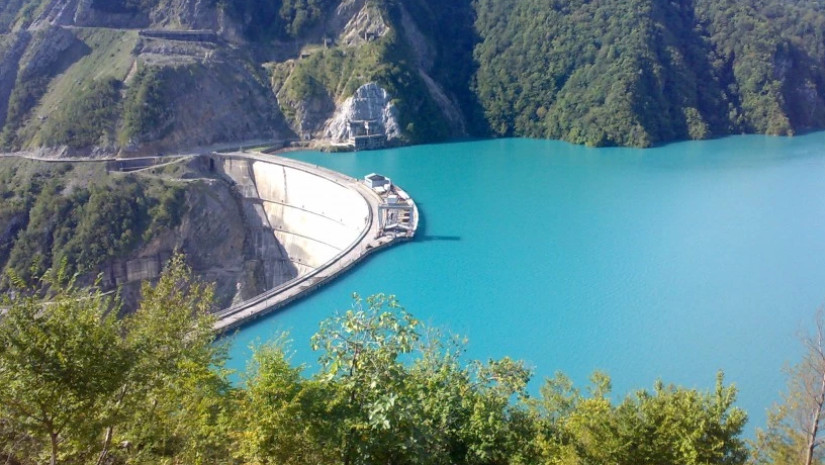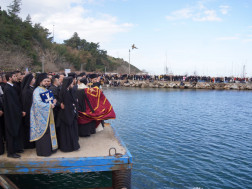Georgia is a country rich with natural resources. Among them, water plays a vital role in drinking, sanitation, agriculture, industry, transportation and, of course, hydropower generation.
On the one hand, the mountains of the Caucasus are famous for hold great ecological value, represent a cultural heritage and are part of the livelihood and very identity of local inhabitants. On the other hand, they present dangers such as floods, landslides, rockslides, or glacier outbursts that must be managed. Mountains also provide a prime location of the installation of hydropower plants, harnessing energy made available by the generous rainfall and irregular landscape.
The Enguri River and its hydro potential will play a key role in the future sustainable development of Georgia.
The Enguri Hydrology Initiative (EHI) was born to improve the management and optimization of water resources in the country. The mission of the EHI is the “Establishment of a consultative group for active collaboration, data and information sharing, and the introduction of international best practice for utilizing hydro-meteorological data and hydrological modelling for hydropower operators and others in the Enguri River Basin”.
The initiative was implemented by the joint-stock company Georgian Energy Development Fund (GEDF), whose 100% of the shares are in the state ownership and is managed by the Ministry of Economy and Sustainable Development of Georgia. Several other prominent stakeholders were engaged in the project, namely the Ministry of Economy and Sustainable Development of Georgia, the Ministry of Environmental Protection and Agriculture of Georgia, the Georgian State Electrosystem (GSE), the Georgian Energy Exchange, the Georgian Electricity Market operator, Engurhesi LLC, the National Environmental Agency, and the European Investment Bank.
Project financing as a non-reimbursable aid (grant) to Georgia was provided by the Austrian government (Drive Fund), which was administrated by the European Bank for Reconstruction and Development (EBRD). EBRD is one of the major contributors to sustainable hydropower projects in the region and, since 1998, it financed three rehabilitation phases of the Enguri hydropower plant. Presently, beyond considering financing of several other smaller hydropower plants in the river basin, EBRD is still invested in the ongoing rehabilitation of the Enguri hydropower plant, with a budget of 35 million EUR.
The Enguri Hydrological Initiative (EHI) was implemented by a team of international experts consisting of a consortium of national and international staff. The leader of the team is the Swiss company "Gruner-Stucky" LLC, which specializes in the field of hydropower and dams, and has been operating in Georgia for more than two decades. Other valuable members of the team are the Swedish Meteorological and Hydrological Institute (SMHI), which is known for its outstanding work in hydrology, meteorology, and climate change, as well as SD Strategies, an innovative company specializing in sustainable development, climate action and governance based in Berlin. Local experts of energy, hydrology, and climatology were actively involved in the implementation of the project. The Enguri Hydrology Initiate Project was implemented for two years (April 2021-April 2023).
The EHI is invested both in the installation of new meteorological and hydrometric gauging stations and in the real-time mathematical models that will make good use of the data being collected. This will provide the base tools needed for world-class management of the Enguri River basin, leading to better protection against floods and improved planning and reliability of energy production. While these are already important goals, the EHI will not stop just there. With a strong emphasis on sustainability, the EHI bets on knowledge transfer and the development of a successful long-term model for the maintenance and operations of the data collection equipment and mathematical models in the future.
The EHI aims to bolster cooperation among key organizations active in the Enguri River basin and enhance decision-making capabilities. To achieve these goals, in frames of the project the hydro-meteorological data acquisition capabilities were evaluated and ways to improve them were identified; were developed hydrological models that can address challenges such as flood security, climate change, or sedimentation.
An institutional structure was formed, the purpose of which is to facilitate cooperation between interested parties, by establishing protocols for data sharing and model ownership and setting up operational systems; transfer knowledge so that local experts can independently tackle important issues such as hydrological forecasting or the optimization of hydropower production; and ensure the continuity of the work.
Within the framework of the project, a technical report and recommendations were prepared, considering installation of new hydrological and meteorological instrumentation in the Enguri river basin. Based on the hydrological (water costs, levels) and meteorological (temperature, precipitation, snow cover) lifetime data collected from new devices, short and long-term hydrological forecast of Enguri river runoff will be possible.
Two workshops were held (September 2022, January 2023), where practical examples of the use and forecasting of the hydrological model of the Enguri River were presented and discussed with the specialists of the stakeholders.
Along with this, within the framework of the project, especially in the completion phase, the hydrological forecasting model of the Enguri River was systematically tested and calibrated together with the specialists of the Georgia State Electrosystem (GSE). The joint work of the consultant and Georgian specialists was fruitful, the forecasting model was refined and adapted based on the obtained hydrological and meteorological data. Finally, the specialists of the GSE can independently work for the hydrological forecast of Enguri river runoff, although cooperation with the Consultant continues.
The transfer agreement of the Enguri Hydrology Initiative project to the Georgia State Electrosystem was signed by Jaba Khmaladze, the General Director of the Georgian Energy Development Fund, Giorgi Gigineishvili, the General Director of the State Electrosystem of Georgia, and Brendan Quigley, the head of the hydropower and dams department of the Gruner Stucky company, on August 4, 2023.
Trough long-term planning and transfer of know-how and tools to local organizations, the advancements achieved during the Project will continue under the stewardship of the Georgian State Electrosystem (GSE).
All foreseen objectives of the Enguri Hydrology Initiative Project were successfully achieved. The added value of the initiative to the country is well recognized, improving safety and bolstering the economy. It should be noted that the EHI could hardly have come at a better time, coinciding with great climate change awareness, the soaring of electricity prices worldwide, and the introduction of the spot energy market in Georgia.
The EHI is an ambitious move focused on learning more about water in the Enguri River and empowering local engineers, scientists, statesmen and private companies to act. The project serves to demonstrate how river basins can be effectively and sustainably managed.
The successful implementation of the Project establishes a solid foundation for the operation and maintenance of the hydrological forecasting system, enabling its potential application in various river catchments across Georgia, such as the Rioni, Mtkvari and other rivers. Georgia will greatly benefit from more affordable and reliable electricity, security, environmental protection, and climate change response.












